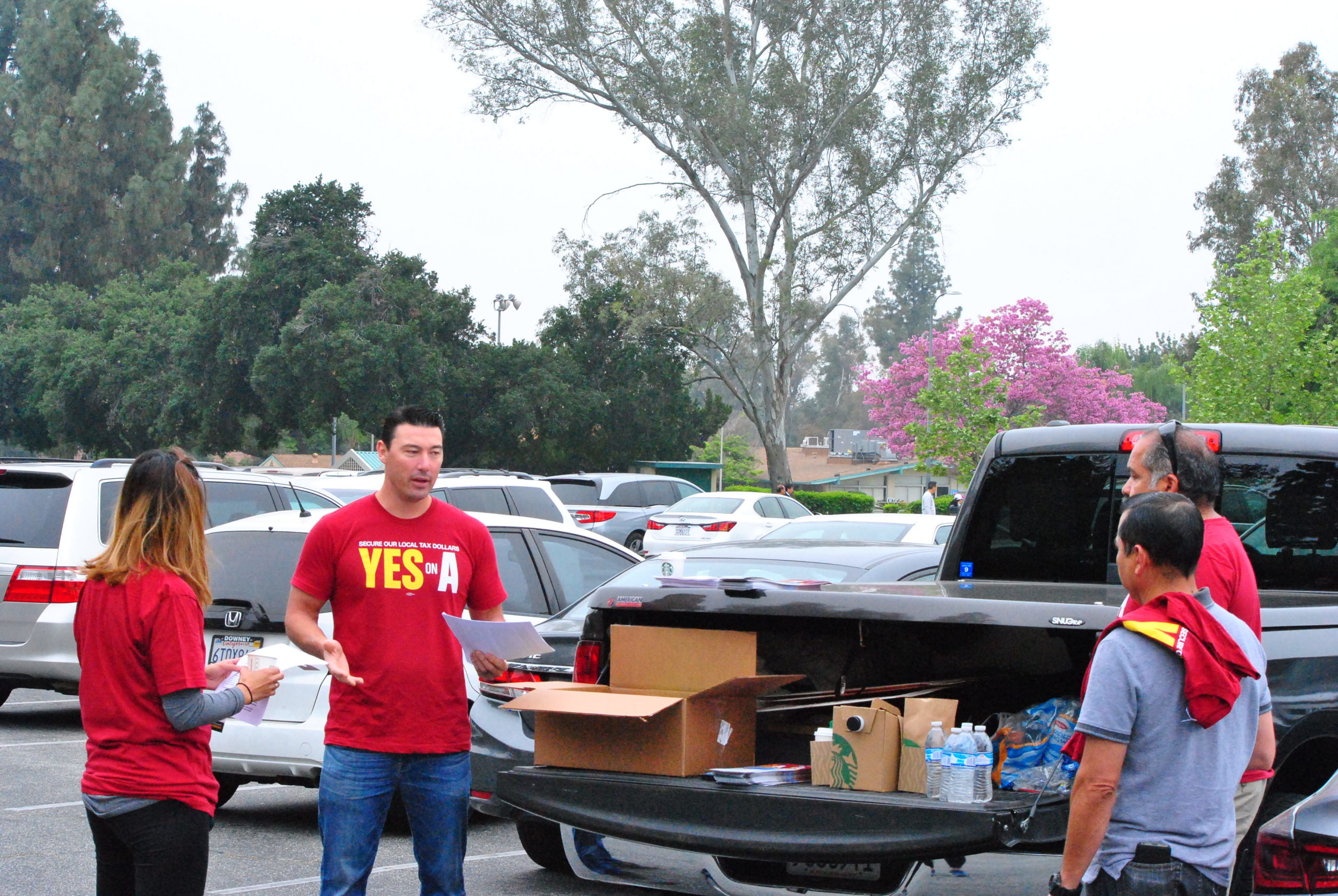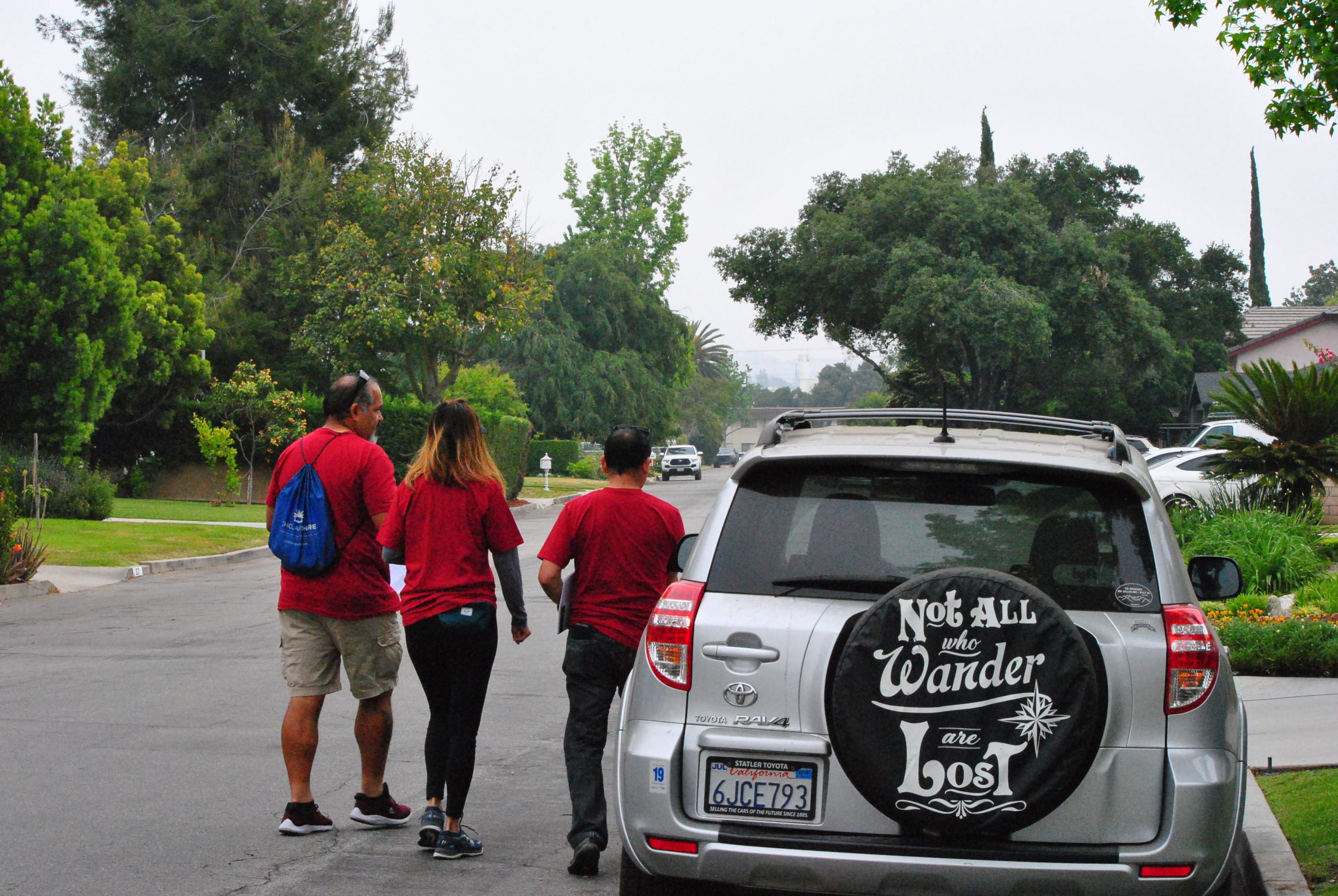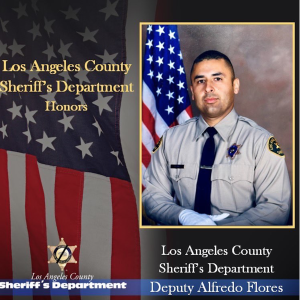 View Winners →
View Winners → Arcadia Volunteers Walk for Measure A

Fireman Rick Oishi speaks to the volunteers before they start walking. – Photo by Galen Patterson / Beacon Media News
By Galen Patterson
On the morning of April 27, volunteers gathered near the peacock fountain in Arcadia County Park to spread awareness for Measure A.
Arcadia firefighters arrived to organize the event and equip volunteers with knowledge, flyers and t-shirts supporting the sales tax increase.
Fireman Rick Oishi offers coffee to the volunteers and instructs them on their task for the morning, reading over the flyer with facts about how Measure A is going to positively impact Arcadia.
There are three volunteers in total, aside from Oishi. Marcos, an employee of Arcadia’s Public Works, arrives already sporting a t-shirt that says “Yes on Measure A,” and color coordinated shoes. This is his second weekend walking to support the measure.
Arriving with Marcos is another Public Works employee, Al. He is given a shirt, along with Connie Mimura of the Arcadia Teacher’s Union.
Oishi is a member of the Arcadia Firefighter’s Association, which is supporting Measure A, but furthermore, he personally supports it. “This isn’t about Democrats or Republicans, it’s about keeping the money in the city,” he tells the volunteers.
He tells them that since Arcadia is not at its maximum sales tax, the county will continue to impose taxes on Arcadia to support other communities in the county. He gives the examples of Measure H and Measure M, the metro and homeless taxes that Arcadia pays to the county and sees little to nothing in return.
If Arcadia continues to operate under budget and cannot pass legislation to fix this, public services will suffer. “We’re going to lose either an engine or an (ambulance),” says Oishi. Losing either will put more strain on the remaining firefighters in the city, and on neighboring communities whom will need to help bear the burden of a reduced Fire Department. “Monrovia already comes into Arcadia once or twice a day,” he said.
When Rick is satisfied the volunteers have enough knowledge to be effective, he gives them a map of the area they will be walking in, along with the residential information of reliable Arcadian voters, to maximize their results. Once they have this information, the volunteer walkers are on their way.
A fire engine sounds its alarm and races north on Santa Anita Avenue. Oishi raises his hand in a half-wave, half-salute fashion, but the driver’s eyes are fixed on the road as he and his team respond to a call.

Marcos, Connie and Al discuss ways to begin the conversation with voters. – Photo by Galen Patterson / Beacon Media News
North of the 210 Freeway, the volunteers have arrived at their destination. Marcos and Al have worked out a route to cover the territory more effectively. They start in a small neighborhood at the southern edge of the territory they are to cover that day. The neighborhood is full of low-hanging trees alternating between colorful flower beds, drought-friendly succulents and ornate statuary.
The three of them stay together in a single group, approaching doors as a team, with coordinated outfits. All are motivated and appear happy to be helping.
They approach their first door of the morning, ring the bell and wait for a moment, but nobody answers. The second house is the same. “Last week, it was about two-thirds of them,” Marcos says, referring to the ratio of doors that went unanswered.
When they ring the bell of the third house, the resident answers. Marcos engages them in conversation, trying to give them as much information as possible in the limited amount of time that door-to-door encounters provide by nature. The group returns to the street. The voter is undecided and the team records the result.
Further down the same street, and man stands outside a home smoking a cigarette. The team engages him. The interaction appears to go well but they do not record the result as a “yes.” The interaction was too brief, and the home was not on their list.
When they reach the end of the first street, they interact with one voter who says they are still unsure but are leaning towards supporting Measure A.
Part of the training Oishi gave the volunteers was to expect people to not be enthusiastic about Measure A. “Feelings can be pretty negative,” he told them. People hear the words “tax increase” and commonly want to stop it from becoming reality but in this case an estimated 60 percent of the revenue generated by Measure A would come from dollars spent by people who visit Arcadia and not necessarily Arcadians themselves.
The three volunteers seem optimistic and their attitudes are unchanged since beginning their walk. Later, Oishi will meet them to collect the information and map, and on the morning of April 28, and many weekends to follow, a new group of volunteers will meet near the peacock fountain and continue to support something they believe in.






































































































